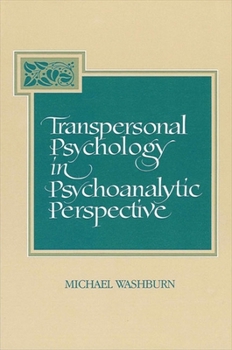Transpersonal Psychology in Psychoanalytic Perspective
Select Format
Select Condition 
Book Overview
In this book, Michael Washburn provides a psychoanalytic foundation for transpersonal psychology. Using psychoanalytic theory, Washburn explains how ego development both prepares for and creates obstacles to ego transcendence. Spiritual development, he proposes, can be properly understood only in terms of the ego development that precedes it. For example, many difficulties encountered in spiritual development can be traced to repressive underpinnings...
Format:Paperback
Language:English
ISBN:0791419541
ISBN13:9780791419540
Release Date:July 1994
Publisher:State University of New York Press
Length:384 Pages
Weight:1.10 lbs.
Dimensions:0.9" x 6.3" x 9.0"
Customer Reviews
1 rating
Excellent approach
Published by Thriftbooks.com User , 21 years ago
Michael Washburn's approach to transpersonal psychology is excellent in many ways. His synthesis of Freudian, Jungian and Wilberian theories, along with Christian and eastern mysticism draws an incredibly rich spectrum of human evolution. Although it seems to be based just on theoretical knowledge and not on empirical one, his ideas are so intelligent and have such precission that I wonder if the books mentions on the bibliography are his only sources. In fact, I think the last chapters lack some refereces to the source where his theory is based upon. However, it's a great contribution to transpersonal psychology and I would say a must read for those interested in it.P.S: If you read Wilber's opinion about this author, naming him as "romantic", you should know it's absolutely unfair. It seems he hasn't read this book when he says that it's about the regaining of the lost paradise of childhood. Washburn never says that childhood is a paradise, nor he says that transcendence is a return to this pre-egoic ideal state. He just points out some good and bad characteristics of non-egoic potentials, and then the same with the egoic ones. Transcendence happens when you get to integrate these two spheres succesfully. Just the same, ironically, as Wilber says about premodern times and modern (and posmodern) times, and I'm sure he wouldn't like someone to say that he's proposing a regression to the eden of premodern times. I appreciate Wilber's work, but his model, being attractive and interesting, does not match reality of human development half as good as Washburn's model does (even if Washburn himself doesn't get to explain certain things in the best possible way). Just to warn to those who got here after reading Wilber's critique of this author and are sceptic about his value.






